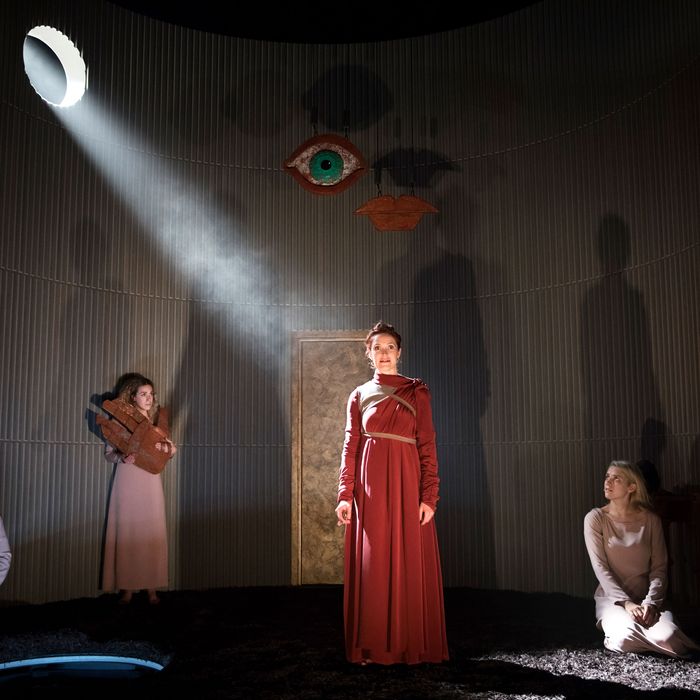Posted on July 29, 2019 at 8:08 pm

Last night I went to Lincoln Center to see Grace McLean‘s thrilling musical, “In The Green.” I have been a fan of Grace’s for years, and she was my guest at a particularly wild SubCulture concert two years ago, so I’ve been excited to see this piece ever since Grace first mentioned it to me back then. To see it come to fruition now, in a really visceral production directed by Lee Sunday Evans and cast with five magnificently versatile and emotional singers, is a very special experience.
The thing is, I don’t usually find much musical inspiration from the musical theater. Most musicals – like, I mean, 99.6% of them, including most of mine – settle the audience in a specific time and place by calling on an already established genre. For example, this show will sound like country music, this will sound like 80’s rock, this will sound like Neapolitan folk song. As composers, we often use the musical genre to help establish the character, and by doing that, we – intentionally! – limit the degree to which the music can go wildly off on its own journey. It’s easier for the audience that way, and honestly it’s easier for the writer – the rules of a country song, an 80’s rock tune, a Neapolitan folk song are already well-established and we just have to fill in those outlines with the musical and lyrical information that we want to use. None of this is a bad thing. There are lots of gloriously talented musical theater composers writing all sorts of cool shit. But it does mean that composers who have their own totally distinctive vocabularies and processes don’t often end up writing for musicals; the demands of commercial storytelling are essentially inhospitable to a defiantly personal musical language. So when I find a composer who writes music that is really new and brave and dangerous, that composer generally doesn’t write shows.

And then there’s Grace.
“In The Green” is packed full of ideas – entire articles could be devoted to unpacking just the dramatic ideas, just the ideas about theatricality and presentation, just the philosophical ideas behind the story Grace is telling. And next to all of those ideas, complementing all of them, are ideas about music: weird, spooky, ecstatic and virtuosic concepts that build on sources as diverse as Gregorian chant, indie rock, hip-hop, Yoko Ono, Meredith Monk, Ligeti, Bjork. Because Grace’s singing voice can do literally anything, many of those musical ideas revolve around the manipulation of the female voice – in layers, in canon, in unison, in silence, and as foreground, as accompaniment, as percussion. What she puts these five astonishing singers through over the course of ninety minutes is unlike anything I have ever experienced in a theater in my life. At every moment, there is a fierce pioneering inventiveness.
The songs don’t often do what we expect songs to do – structurally, harmonically, dramatically, they can go wandering all over the place. Likewise, the storytelling can be diffuse and obscure. Nothing about “In The Green” is easy, and Grace chooses, repeatedly, to make left turns over the expected satisfaction of resolution. As an audience member, you’ll either go with that or you won’t; I’m sure plenty of people walk out scratching their heads. But for the composers and musicians out there reading this, and for the theater-makers who like a little resistance when they’re turning the wheel, “In The Green” is a piece to be reckoned with. There is an a cappella duet in the middle of the show that is simultaneously terrifying and beautiful, in a way I have never heard before. In twenty years, we can take the measure of Grace’s work and see how it grew from this moment; but right now, we have this show, and what’s really wonderful about this production is how purely and thoroughly Grace’s intentions are being served. She was not pushed to sand down the edges. But the rewards of a bumpy ride can be even greater than the smooth sail.
Kudos to Kris Kukul and Ada Westfall and a really powerhouse band, and especially to the five tireless singers: Rachael Duddy, Ashley Pérez Flanagan, Mia Pak, Hannah Whitney, and the den mother, visionary, and iconoclast at the center, Grace McLean.
This is the final week of performances; the show closes on Sunday, August 4.
No comments yet. You should be kind and add one!
The comments are closed.